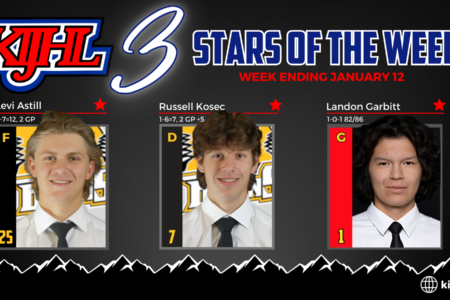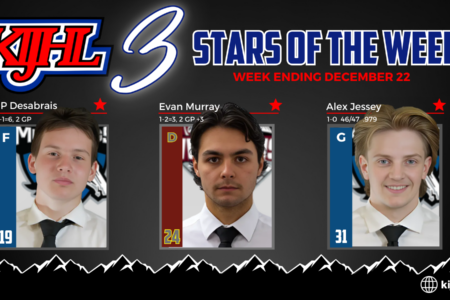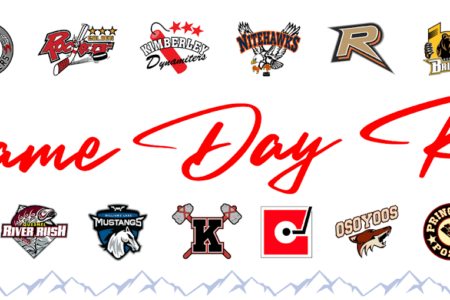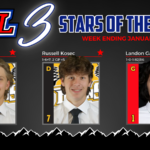Canucks Playoff Preview - Round One Vs. Kings
Leigh Ramsden lives in Vancouver and is an avid Canucks fan, having been a partial season ticket holder for over 10 years. He’s old enough to have witnessed all three Stanley Cup losses, as such, his prime goal is to remove those scars by seeing a Cup brought to Vancouver. Leigh is Fighting For Stanley’s (www.fightingforstanley.ca/vancouver) west coast correspondent, and will also blog after all Canuck games for The Nelson Daily.
After the events of last Saturday night, the Vancouver Canucks found out they drew the plucky Los Angeles Kings in the first round of this year’s Stanley Cup tournament. Vancouver won 8 of its last 9 games to finish first in the tight Western Conference.
On the other hand, the Kings limped into the postseason, losing three of their last four in either overtime or a shootout, including two in a row to end the season against the San Jose Sharks. Those losses relegated the Kings to eighth spot and their solidified their date with the Presidents’ Trophy winners.
We know the Canucks have been a high-scoring, high-flying team in recent years, but took a bit of a right turn in 2012 and started to play much more sound defensive hockey, at the expense of some of their offense.
The Kings, on the other hand, have played most of the year in a defensive shell, netminder Jonathan Quick recording an impressive 10 shutouts. L.A. has had trouble scoring all year as well, and made a coaching change back in December when they fired Terry Murray and brought Calgary Flames destructor Daryl Sutter (and his horrible, 70’s-inspired suits) aboard. The Kings continued on the same trajectory after Sutter was hired, however, after the trade-deadline acquisition of sniper Jeff Carter, the Kings have been scoring at higher rate.
How do these teams stack up against each other? Let’s take a deeper look.
SEASON RECORD AND SEASON SERIES
The Canucks secured the league-wide title with a record 51-22-9, while the Kings finished 16 points in arrears with a record of 40-27-15. When looking into the quality of each team’s record, the Canucks record was 36-22 (.621 winning percentage) in regulation time, 7-2 (.778) in games decided in overtime, and 8-7 (.533) in the less relevant games decided in a shootout.
On the other hand, the Kings were 31-27 (.534) in regulation, 3-6 in overtime (.333), and 6-9 (.400) in the shootout.
If you ignore the games decided in the skills competition, the Canucks were 19 games above .500 at 43-24 (.642), while the Kings were much more pedestrian, finishing only one game above .500 at 34-33 (.507). Give the Canucks the edge in this area.
Part of the difference here will be the fact that the Kings play in much tougher division than do the Canucks – none of the other Northwest Division teams finished above the playoff bar, whereas the Pacific Division delivered not only the Kings, but also the Coyotes and Sharks.
The Canucks beat up on their divisional foes finishing with a record of 18-5-1, whereas the Kings were a much more pedestrian 8-8-4 against their Pacific Division rivals.
It was this difference that separated the two teams in the standings. Consider this: the Canucks record outside the Northwest and Pacific divisions was 22-12-4, and the Kings were 19-15-4. From looking at the non-divisional records, it appears the two teams are relatively equal, but give the Canucks a slight edge due to their marginally better record.
The Canucks won the season series 2-1-1, with one of the wins coming by way of a shootout. Overall, the four games were played relatively evenly and the Kings looked the better team through large stretches of all of them.
That said, the Canucks were good enough to win two games in regulation (each one a one-goal game) and lose another in shootout.
The only game that they lost in regulation was 4-1 Kings, in a game where the Canucks didn’t put their best effort on the ice. These games were a microcosm of each team’s season – the Kings played things close to the vest and couldn’t outscore their opponents while not allowing much, while on the other hand, the Canucks struggled to score, but did “just” enough to win, nothing more, and nothing less.
Based on the team’s head to head record, you’d have to again give the edge to Vancouver.
GOALTENDING
Los Angeles boasts one of the league’s best netminders in Quick, who is sure to receive a Vezina trophy nomination for his stellar body of work this year. Quick is the biggest reason the Kings were able to scrape into the playoffs.
Quick played in 69 games for the Kings, fourth in the NHL behind Pekka Rinne, Jonas Hiller, and Miikka Kiprusoff. He finished second in the NHL with a 1.95 GAA, and was fifth in the NHL with a save percentage of .929. His 10 shutouts led the NHL. Clearly, Quick was L.A.’s most valuable player.
The Canucks on the other hand boast not one, but two of the league’s best goaltenders. Number one goalie Roberto Luongo played in 55 games, recording a GAA of 2.41 (15th in the league) and a save percentage of .919, good for 12th in the league.
Backup Cory Schneider played 33 games, and had an excellent GAA of 1.96 with a save percentage of .937, third and second in the league respectively.
This season wasn’t Luongo’s best statistically, but he has played a number of tremendous games for the Canucks this season. Together, the two goalies combined for 8 shutouts this year.
Quick is inexperienced, having only 12 career playoff games, compared to Luongo who has 59 career contests. Of course, Luongo has run into problems in each of the Canucks’ last three playoff years, struggling at times against Chicago and in last year’s finals against Boston. However, in Schneider, the Canucks have a legitimate go-to number 1(b), as he’s shown his ability to step in and play in big games, all season long.
Quick’s had an incredible season, there’s no doubt, and although fatigue may be a factor given his workload this year, if he was pitted against only Luongo you’d have to give the Kings the edge.
Unfortunately for Los Angeles, the Canucks have a fail safe in Schneider, and for that reason give the nod to the Canucks between the pipes.
DEFENSE
The Kings finished with 170 goals against, good for second in the NHL. The Canucks were fourth at 191 goals allowed.
The Kings’ defensive corps boasts one of the league’s best young defensemen, Drew Doughty. He is typically paired with Cup-winning veteran, Rob Scuderi.
The Kings’ other two pairings are typically ex-Canuck Willie Mitchell alongside young Russian Slava Voynov, and Matt Green playing with Rafael Diaz. With the exception of Doughty, none of these blueliners are spectacular, however, together they form a very solid and efficient six-man unit. Scuderi and Greene provide the most physicality.
The Canucks look to start the series with the pairings of Bieksa-Edler, Hamhuis-Tanev, and Salo-Rome. The defense has been playing very well of late and while none of these guys boast the kind of offensive flair of a Doughty, four of the six are legitimate threats offensively.
In addition, this group does a tremendous job of moving the puck out of the zone with efficiency, getting the puck to the forwards.
Generally, I get nervous come playoff time when the Canucks have to face a Norris-calibre defenseman. Doughty was nominated for the award in his breakout 2009-2010 campaign, but has failed to live up to the hype since then, reporting late to camp last fall after a contract dispute.
In addition, in the games against the Canucks this season, they have been able to get Doughty off his game mentally, causing him to take a number of unnecessary penalties.
The Canucks also boast much better depth. I’m not sure who the Kings have in reserve, but trading Jack Johnson away at the deadline hurt their depth badly. The Canucks have at least three NHL-calibre defensemen in reserve (Keith Ballard, Andrew Alberts, Marc-Andre Gragnani), each of whom can slot into the sixth spot and give the team a much different look.
For defense – give the edge to the Canucks, as their offensive abilities and depth should be enough to overcome Doughty’s top-end talent.
FORWARDS
The Kings’ top-six is extremely good on paper, boasting Anze Koptiar, Justin Williams, Mike Richards, Jeff Carter, and Dustin Brown. The team has been scoring well of late, averaging three goals per game over their last 18 games, which roughly coincides with the acquisition of Carter at the trade deadline.
Kopitar can be one of the league’s most dynamic players, however, in my mind he continues to fail to take that “next step” to elite superstar status. Justin Williams has had a bit of a down year, but he was the Kings’ best forward in their 4-1 victory over the Canucks back in December.
Mike Richards has had a garish campaign (I should know as I have him in my fantasy league), and after returning from a concussion in late December, he hasn’t appeared to be the same player he was before. Carter is returning from a recent bone bruise injury and may not be as effective as he normally would be.
The Kings’ bottom-six begins to thin out, and includes players such as Jarret Stoll, Dustin Penner, Brad Richardson (out after an emergency appendectomy), Kyle Clifford, Matt Lewis, ex-Blackhawk Colin Fraser, and a collection of 12th/13th forwards to round out the lineup.
While the Kings’ top end talent can compare to Vancouver’s, their depth up front is suspect and coach Alain Vigneault should be able to exploit favourable matchups.
Given his line’s great two-way performance, Sammy Pahlsson will likely see a lot of ice against Kopitar, and if his line can neutralize the Kings’ first unit (possibly chipping in with the odd goal), things should look good for the Canucks. The addition of Pahlsson has been huge for this team, and has impacted it much more greatly than I expected when it was consummated at the deadline. It’s the single biggest reason the Canucks have been able to clamp down effectively on their opposition.
When the Pahlsson line takes these tough minutes, it will enable AV to get the Kesler line out against the Kings’ third or fourth lines and that should result in some goals for the team in blue and green.
The big question mark for the Canucks remains over Daniel Sedin’s status. If he is able to play it opens up a lot of possibilities for Vigneault as he can move Max Lapierre and Mason Raymond around the lineup as required.
Although there was some drama around this situation today, expect the Canucks to have Sedin in the lineup as quickly as possible, currently looking like game 2 or 3 of the series assuming there are no setbacks.
In another close competition, give the Canucks the edge here with two caveats: the Kings have enough talent to put the puck in the net and if their forwards raise their game they can compete; and if Daniel Sedin doesn’t play in the series, the scale may tip to the Kings in this area.
COACHING/INTANGIBLES
All Canucks fans have seen Sutter’s act before and we should all know what to expect. Sutter will employ a physical, borderline dirty approach with his troops in order to try to get the Canucks off their game.
The Kings have the horses to play this way, with Fraser, Clifford, Richardson (when healthy) and Greene all able to mix it up and agitate. This approach is one that’s used consistently against Vancouver and it has had success in the past.
For this reason, the Canucks’ power play will have to produce to discourage the Kings from taking too many liberties, and if it doesn’t, expect a dirty series with many scrums, yapping, and confrontations.
The Canucks’ team toughness has been questioned throughout the year but I believe they’ve answered the bell when required. They have some big, tough players at their disposal (Byron Bitz, Zack Kassian, Dale Weise, Alberts) and I believe at least one of these guys will be in the lineup at all times to keep the Kings honest.
There are a number of other players on the team that won’t back down from anything as well, including Bieksa, Lapierre, and Ballard if he’s in the lineup.
Vigneault is one of the league’s best coaches and his ability to tinker with his lineup to find combinations that are effective is constantly impressive. He’s also handled the goaltending situation extremely well throughout the year and has set himself up to have both netminders at his disposal without the team missing a beat.
Sutter is an old-school coach with limited understanding of the intricacies of the current-day game, but, his best success in the NHL was as coach of the Calgary Flames, leading them to an improbable Stanley Cup appearance, so he knows what it takes from that perspective.
The Canucks are fresh off their Stanley Cup appearance last season and return virtually the same group, so one would think they hold a distinct advantage here. Bear in mind that two of the Kings’ leaders, Richards and Carter, both went to the Cup final two seasons ago when they were with Philadelphia.
Mostly because of Vigneault’s ability to adapt, give the edge again to the Canucks.
SUMMARY AND PREDICTION
In my opinion, the Canucks hold a slight edge in all the categories mentioned above. That said, the difference between the two clubs is very small and Vancouver will not be able to roll over the Kings. The Kings’ top-notch goaltending can win them a series on its own and given the fact they have been scoring more of late, they will present a formidable opponent.
The key to the series may boil down to special teams. I expect the Kings to employ the typical Canuck-killer strategy, which is after-whistle shenanigans, dirty hits, running the goaltender, and other marginal plays.
I expect they will cross the line and the Canucks will be given their chances on the PP. If it can convert, expect a similar series to last year’s Sharks series with the Canucks winning in 5.
If the Canucks can’t convert on the PP, it will bolster the Kings’ approach and this is where it can get dicey for Vancouver. They will have to control their emotions and stay out of the penalty box, and if they have to withdraw into lock-down mode, they will do so.
Luckily, the Canucks have shown that they can employ this style of game effectively, perhaps the most relevant example being their 1-0 shutout of this Kings team 7 games before the end of the regular season on March 26. If this route is taken, the series will stretch longer.
At the end of the day, the Canucks are marginally better than the Kings all over the ice, and this will result in a number of close games, but games where they should be able to get over the top.
Canucks in seven.


























Comments